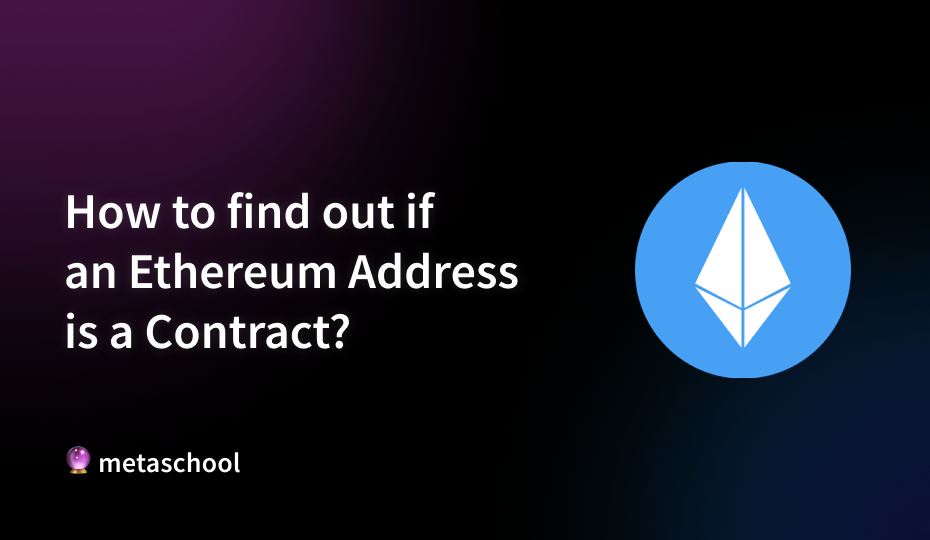Table of Contents
Knowing whether an Ethereum address is a smart contract address or an externally owned account (EOA) address can be important for a lot of reasons. Let’s discuss a few reasons why:
- Transaction Behavior: A smart contract can be programmed in a way that whenever it receives a transaction, it triggers an automated action. In contrast, EOAs are controlled by private keys and do not have such automated behaviors. So knowing the type of the Ethereum address can help anticipate the outcome of any transactions or other interactions.
- Security Considerations: Interacting with unknown smart contracts can pose severe security risks (and is definitely not recommended), as they may contain malicious code. Identifying an Ethereum address as a contract allows for due diligence, such as reviewing the contract’s code and verifying its authenticity before engagement.
- Functionality and Compatibility: Some operations or applications may be designed to interact specifically with either contracts or EOAs. For example, sending tokens to a contract that isn’t designed to handle them could result in a loss of funds. Understanding the address type ensures compatibility and prevents errors.
- Gas Optimization: Transactions that involve smart contracts may require more computational resources which may lead to a higher gas fees. By identifying the address type, users can estimate transaction costs more accurately and avoid losing their money unintentionally.
Now that we know why it’s important to be informed about what an Ethereum address may be tied to, we will be going through two methods that you can use to determine whether the address is a smart contract address or an EOA address.
Using Etherscan to look for Ethereum address
In Ethereum, the easiest way to determine whether an address is a contract is by going to Etherscan and pasting the address.
- Go to Etherscan: Navigate to the Etherscan website.
- Search for the Address: In the search bar, enter the Ethereum contract address you want to check. And then click on search.
- View Address Information: Once you’ve searched for the address, you’ll be taken to the address’s details page on Etherscan. This page will show you information related to the address you have entered which is publicly available for everyone to view.
- Check the ‘Contract’ Section: If the address is a contract, on the address details page, there should be a section labeled “Contract” or “Contract Information.” If the address is a contract, this section will display details about the contract, such as its bytecode, creation transaction, entire code of the contract if it has been verified and some other information related to the contract.
- EOA vs. Contract: If the address is an EOA and not a contract, the “Contract” section will not appear, and you’ll mostly see transaction history, balance, and other details associated with an Ethereum address. EOA simply refers to regular Ethereum address owned by an entity and are controlled by private key.
🔥 Check this out: Build in Public
Using the Code Size of the Address
Another way you can determine whether a given address is a contract or an EOA by checking the code size of the address. If an address is a contract, its code size will be greater than zero, as contracts have bytecodes associated with them, whereas EOAs do not.
pragma solidity ^0.8.0;
contract AddressChecker {
function isContract(address _address) public view returns (bool) {
uint256 codeSize;
assembly {
codeSize := extcodesize(_address)
}
return codeSize > 0;
}
}In this contract, the isContract function takes an Ethereum address as an argument and returns true if the address is a contract and false if it’s an EOA.
🔥 Check this out: Write Your First Solidity Smart Contract on Ethereum
Conclusion
Understanding whether an Ethereum address is a smart contract address or an EOA address is important to ensure secure and efficient blockchain interactions. This knowledge enables users to anticipate transaction behaviors, assess security implications, ensure compatibility, and optimize transaction costs. If you can successfully identify the nature of an address, you can make informed decisions and potentially save yourself from making a costly mistake (literally).
FAQs
What is the difference between an Externally Owned Account (EOA) and a Smart Contract Account?
An Externally Owned Account (EOA) is controlled by a private key and is typically used by individuals to manage their Ether and initiate transactions. In contrast, a smart contract account is governed by code deployed on the Ethereum network, operating autonomously based on predefined rules without requiring a private key.
How can I determine if an Ethereum address is an EOA or a smart contract?
To identify the type of an Ethereum address, you can use blockchain explorers like Etherscan. By entering the address into the search bar, you can view its details. If the address is a contract, there will be a “Contract” section displaying information such as the contract’s bytecode and creation transaction. Additionally, in Solidity, you can check the code size of an address; contracts have associated bytecode, resulting in a code size greater than zero, whereas EOAs have a code size of zero.
Why is it important to know whether an Ethereum address is an EOA or a smart contract?
Understanding whether an Ethereum address is an EOA or a smart contract is essential for:
Transaction Behavior: Smart contracts trigger automated actions, unlike EOAs, which rely on private keys.
Security: Unknown contracts may carry malicious code.
Compatibility: Some operations are tailored for contracts or EOAs.
Gas Fees: Smart contract interactions often incur higher gas costs.
